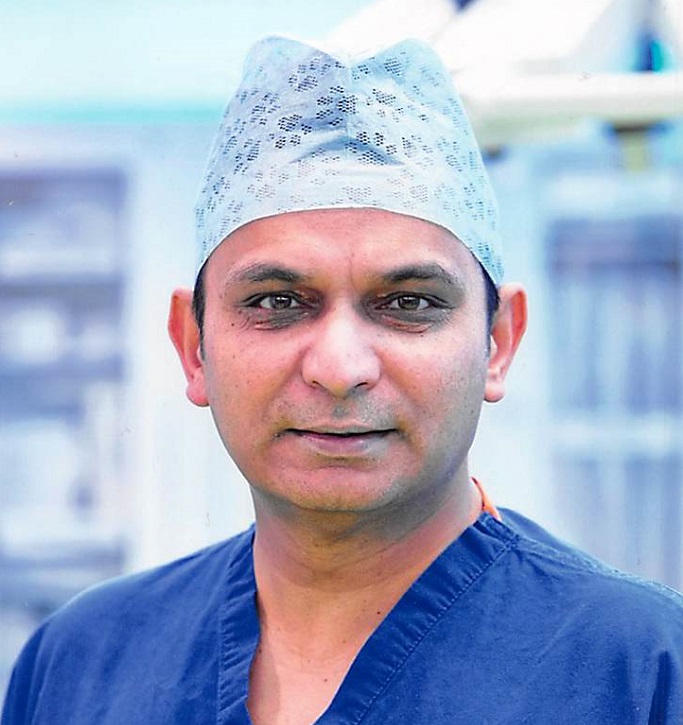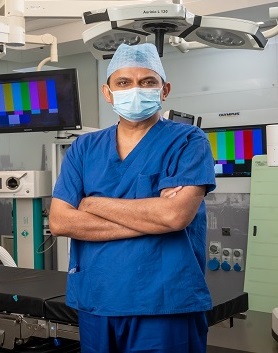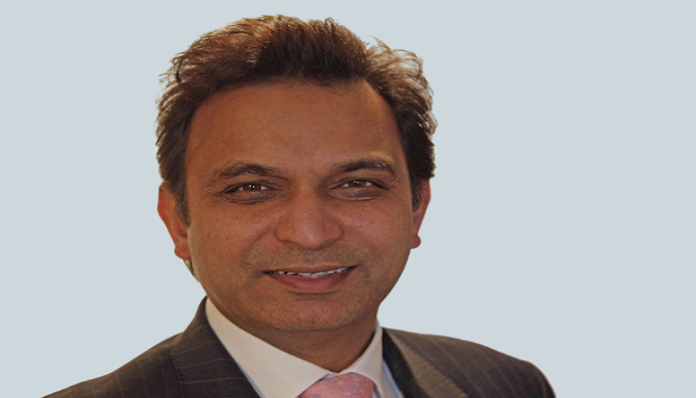British-Indian scientist and clinician, Prof. Prokar Dasgupta’s 30-year career has been dedicated to ground-breaking research assisting important health issues and innovative surgical solutions. He has played an important role in the introduction of modern robotics, which has transformed the way surgery is practiced worldwide, particularly with regards to prostate cancer. For his immense contributions, Prof. Dasgupta has been conferred the Padma Shri Award by the President of India this year. The Indian Practitioner presents snippets from the life of the first Professor of Robotic Surgery and Urological Innovation at King’s College London who pioneered robotic surgeries in the UK and world over.
Born in the beautiful steel City of Rourkela, Odisha, Professor Dasgupta reminisces his fondest memories to be of his childhood spent at his mother’s ancestral home in Lucknow, Uttar Pradesh, where he recalls being perched atop rooftops for hours flying kites with his family. He completed his medical education from Medical College Calcutta in 1989, one of the oldest medical institutions in the North East.
Venturing into Urology
Prof. Dasgupta credits his grandfather, also a doctor, to being the influencing factor that drove him to opt for the medical profession. “While in medical school I really wanted to study immunology in Harvard but my chief thought that I had the ‘hands of a surgeon’ and nudged me gently in that direction,” he remarked.
“My scientific career started when I began studying the immunology of leishmaniasis, caused by a parasite. This was closely related to the effect of splenectomy to save the lives of patients who were drug resistant. So, it was not difficult to make the transition from surgical science to the sub-specialty of urology. Around this time, one of my role models brought a Dornier lithotripter to Kolkata, India, to break kidney stones; this was a game changer as it avoided open kidney stone surgery in most patients, including some members of my own family. It became clear that urology was a fascinating surgical specialty, and I was inspired to take it up,” Prof. Dasgupta elaborated.
He further went on to pursue a career in the UK where he completed a research doctorate at the National Hospital for Neurology and Neurosurgery, Queens Square, London, followed by specialist training in Urology at Guy’s Hospital and the Institute of Urology. He later joined Guy’s Hospital in 2002 as a Consultant Urologist where he pioneered the technique of robotic surgery in the field of urology.
In 2012, he also led the British Journal of Urology International as Editor-in-Chief and in 2020, he was appointed as the first Professor of Surgery at King’s Health Partners where helped the strategic direction of research in surgical practice and innovation and supported capacity building in academic surgery for the Academic Health Sciences Centre.
What drove him
Prof Dasgupta has three simple principles that drive him:
- Never be afraid to dream big
- Always do your best without worrying about outcomes
- Always support and learn from others around you
“I was deeply motivated to go into robotic urological surgery by meeting three giants in this field – the late John Wickham, the first ever robotic surgeon, Louis Kavoussi from Johns Hopkins, a pioneer in surgical robotics with whom I performed the first telerobotics trial ever (STAR TRAK), and Mani Menon, from the Vattikuti Institute, who developed and popularised robotic surgery for prostate cancer.”
Realising that robotic surgery through keyholes have several advantages but lacked technological evidence, he joined forces with the mechanical engineering and biomedical engineering labs at King’s College London to develop the sense of touch, which was currently lacking in robotics, along with image guided surgery, 3D printed robotic surgery, augmented reality and more recently surgical data science using Artificial Intelligence.
The “Dasgupta technique” and beyond


In 2005, he led the team that used a da Vinci robot to perform one of the early keyhole operations to retrieve a kidney as part of a kidney transplant, in Britain. Ten years later, he successfully removed a cancerous tumour from a man’s prostate using a 3D-printed replica prostate as an aid to surgery.
He also played a crucial role in establishing the Prostate Cancer Research Centre at King’s College London and developing a modified cytotopic agent for localised immunotherapy for which he informs that his organization has recently received a patent. He has also led the first randomised trial of robotic simulation across 15 nations to show that it makes a difference to patient outcomes and creates better surgeons.
The Life Lines Project- India
He was also instrumental in bringing the Life Lines project to the AIIMS hospital in Rishikesh, India, a virtual-visiting solution that helps families connect with their loved ones being treated in intensive care units (ICU) during the COVID-19 pandemic using a tablet platform called ‘a TouchAway’. The project was originally created in the UK. “As India’s COVID-19 crisis hit, I worked with colleagues across King’s Health Partners to rapidly develop and successfully implement plans to use the same technology to connect with India’s clinicians on the frontline. This enabled them to access expert guidance, training and support.”
He has also mentored several young researchers and students, many to their own chairs.
Describing the challenges faced by him and his colleagues during the height of the pandemic, Prof. Dasgupta says that the surgical output at their hospital had dropped by around 80%. “Thankfully, many of the patients with prostate cancer could be managed with hormonal treatment without affecting their final outcomes. Very few of our patients came to see us face-to-face, so we had to rapidly learn the art of teleconsultation. It affected our trainees and students and we tried to reduce that effect through simulation, webinars, and remote learning using augmented reality,” he pointed out.
Accolades and reception
 The humble professor has several accolades to his name. Apart from the Padma Shri, which he was conferred recently, he has been awarded the St. Peter’s Medal in 2020, which is the highest recognition from the British Association of Urological Surgeons for contributions to the surgical field of urology. He was also recently awarded the King James IV Professorship by The Royal College of Surgeons of Edinburgh, which is the most senior award of the society awarded to him to recognize over 25 years of translational research that had positively impacted the quality of life of many patients with overactive bladders.
The humble professor has several accolades to his name. Apart from the Padma Shri, which he was conferred recently, he has been awarded the St. Peter’s Medal in 2020, which is the highest recognition from the British Association of Urological Surgeons for contributions to the surgical field of urology. He was also recently awarded the King James IV Professorship by The Royal College of Surgeons of Edinburgh, which is the most senior award of the society awarded to him to recognize over 25 years of translational research that had positively impacted the quality of life of many patients with overactive bladders.
He has big plans for the future. “Going forward, my main focus will be on surgical data science to make a real difference to patient outcomes and the training of the next generation of surgeons. This involves using a variety of methods such as video-labelling, image guidance, haptics, 3D volumetrics, flexible systems, augmented reality and machine learning. With our industry partners, we have also pioneered ultra-low latency communication in robotic surgery with what is called the ‘Internet of Skills’,” he says.
Beyond his work, Prof. Dasgupta describes himself as a“tennis fanatic.” “I love watching Roger Federer play,” he proclaims. He has successfully completed several marathons and happens to be, in his own words, a “reasonable cook.”
“During a BBC documentary entitled ‘a day in my life’ many years ago I mentioned that I organise my life using a paper diary (still do) to much laughter from my colleagues!!”























